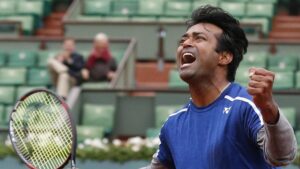Leander Paes, the first Indian to be inducted into the International Tennis Hall of Fame, reflects on his career and the evolution of Indian tennis. You wouldn’t usually expect Leander Paes, who has an excellent handicap of 2, to answer that he’s loving playing golf when you casually ask him how his life is going.
He continues by saying that he now has more time to play football, which he says is his stronger sport. And he is thrilled to be spending time with his parents after an incredible 32-year professional tennis career.
When you question him about tennis, which he has represented India with since before he got professional in 1991, he replies that he enjoys just competing in exhibition matches.
“I spent the most of my life playing tennis. It is astounding to him today that he has been a professional athlete for such a long time, says 50-year-old Paes.
But he’s much more than just a top-tier athlete. In men’s doubles and mixed doubles, Paes has won eight Grand Slam titles and ten in total. He is one of just three players in the annals of tennis history to win a Grand Slam in both doubles categories during his career.
Not only that, but he and his former partner Martina Navratilova hold the record for the most mixed doubles Grand Slam victories during the Open Era.
Although it’s improbable that another Indian will surpass his record anytime soon, Paes cemented his place in tennis history this week when he became the first player from India to be admitted into the International Tennis Hall of Fame.
In addition, it is a fitting acknowledgement of his long career and his Grand Slam victories. It’s also difficult to overlook the extraordinary heights he reached for his nation during the Davis Cup and his incredible seven Olympic appearances.
There wasn’t much tennis knowledge or infrastructure in the nation when Paes was starting to establish himself as a junior in the sport. The topic of physical and mental fitness has just recently gained attention.
Early difficulties
Paes didn’t have the money to go on the international tour, and India didn’t have the necessary infrastructure. That was a rather difficult combo.
“Those were very difficult times. In Europe, I had the experience of sleeping in changing rooms due to the high cost of hotel rooms and hitching. I still have the scar on my chest as a reminder that I was mugged in New York.
But it goes beyond his difficulties while playing. He hardly ever succeeded in the business.
“I like to say that I’ve experienced incredible adversity. I have a brain tumor, and I have been in a cancer hospital for seven months.
At one point, my heart condition—a mitral valve prolapse—made doctors doubt my ability to compete professionally. I also had to wear a metal cast for ten months since, as a ten-year-old, playing too much football had ruptured the ligaments in my right knee.
Memorable successes
It’s difficult to choose just one, or even five, of a person’s 55 professional titles. Although he insists that his 1996 Olympic bronze medal will always be the centerpiece of his trophy case, he claims that winning the Wimbledon junior singles championship in 1990 was what first made him think he could make a living playing tennis.
What’s next?
Even though Paes is relishing his time off from the demands of being a professional athlete, he is gradually adjusting to his new stage of life.
“I am fully committed to the business I own. He continues, “There’s coaching, though that’s not a full-time thing,” and then discloses that he had recently assisted Greek tennis player Stefanos Tsitsipas.
He claims that despite having to continuously reimagine his professional goals, his dream still stands.
“In the next 15 years, I want to see 250 million children in India participating in sports. We will be able to identify talent, send them to academies that cultivate talent, and create a fantastic sporting ecosystem once the foundation of Indian schools in both urban and rural areas is established.
Nothing can stop us if Leander can move from barefoot football and gully cricket to winning trophies worldwide. We submitted an Olympic candidacy for 2036. That will be in thirteen years. A 10-year-old now might medal at those Games as a 23-year-old. Everything is conceivable.
Numbers
- Leander Paes has won eighteen Grand Slam titles. Ten in mixed doubles and eight in men’s doubles
- The number of weeks Paes spent in the top 10 of the ATP doubles
- Paes topped the ATP Doubles Rankings for 37 weeks in a row.
- Seven is the number of Olympic Games in which Paes has competed.

































